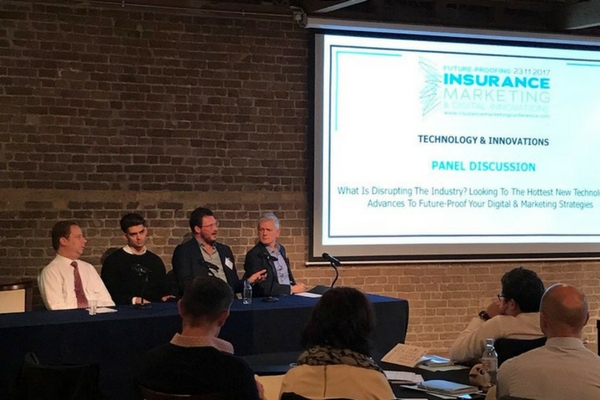There’s unanimous agreement around just about every sector that innovation is needed across multiple areas. Nobody wants to be the Blockbuster of their industry, moving too slowly and getting killed off by a younger, more visionary competitor. But unless your pot of money, time, and talent is endless, you need to make choices. How do you know what direction to head in to find the innovations that give you that edge? As Head of Innovation at AXA Partners UK and Ireland, it’s Milan Sud’s job to turn such blue sky thinking into bottom line impact.
We first encountered Milan about a year ago at the Insurance Marketing Conference in London, and have frequently seen him providing razor sharp thoughts on both the insurance industry and wider topics around innovation ever since.
Read on to hear Milan’s thoughts on the future of insurance, scaling up ideas, and what to look out for in 2019.
Infinity: What are some of the key areas where insurance marketers can currently innovate?
 Sud: For me right now the key element for us as insurers is the requirement of on demand services driven by unparalleled levels of connectivity. The modern day consumer is always on and always expectant of real time service. We are already seeing a shift from reactivity to proactivity in terms of customer expectation and insurers will have to deliver services in line with this. We have a real focus on harnessing connectivity whether that be in the home, motor vehicle, health space through wearable tech and travel through GPS triggers to deliver better services.
Sud: For me right now the key element for us as insurers is the requirement of on demand services driven by unparalleled levels of connectivity. The modern day consumer is always on and always expectant of real time service. We are already seeing a shift from reactivity to proactivity in terms of customer expectation and insurers will have to deliver services in line with this. We have a real focus on harnessing connectivity whether that be in the home, motor vehicle, health space through wearable tech and travel through GPS triggers to deliver better services.
What’s one of the first challenges that understanding the possibilities across different channels will help to solve?
A lot of advertising is seen as being a nuisance (such as pop-ups and TV breaks) that disrupts the consumer’s day, they see it as an annoyance as opposed to benefiting them. With unparalleled levels of connectivity to the audience, we have an opportunity to understand them far better and improve how we communicate with them. Where and when we reach them, and vice-versa, can be far more relevant, as can the message we communicate with them.
From a creative messaging standpoint, how does this work?
In insurance, we’re delivering a necessary product rather than an enriching one. When we talk about changing our products and services, what we’re really looking at doing is raising the expectations that our customers have of engaging with an insurance company. For example, Uber customers are now used to simply booking and paying, without fussing too much about the cost on most occasions. It’s a seamless transaction, which insurance should be looking to emulate.
Putting this all together, there are many things you do in your home and online that can help us predict behaviour ahead of time. Let’s say it looks like you’re booking a holiday, we can then deliver reminders about travel insurance at a time it may be useful for you. Timely and relevant messaging is going to be far better for both us and the audience.
How do you bring innovative ideas to life at a business the size of Axa?
In linking innovation to sales, I have to turn ideas into reality and bring business models to life. Something like the aforementioned pay on use/on-demand space represents a seismic shift for how the business sells insurance. Our previous expertise has been based on selling on price and risk, but with this change, we need to start looking at challenges related to networks and operations.
To do this, we don't do a big bang from day one. Small and specific projects are what you should work on at first. Anything you implement is tested in early days with frequent learning and feedback. Then we gradually get people elsewhere in the business comfortable with what we are trying to do. Failing to do this means that the support functions you need to work alongside will put up blockers.
What are the key digital changes insurers are looking to make, and why?
Any big organisation has a focus on cost reduction without reducing the quality of service we provide. Also, anything in the management of networks or claims journey that can be automated, the better, but you need to retain a human touch. As an insurer, you always have to be conscious that you are often only interacting with people when they are paying you or something bad has happened. Making the process as easy for them as possible is always a huge focus for us.

Milan Sud speaking with Infinity CEO Paul Walsh on a panel at the Insurance Marketing Conference in London, along with AIG and Allianz.
Are there any specific areas of technology that you are investigating?
Artificial intelligence has a lot of potential in our field, I am often researching and testing how we use it to automate more processes and services. Also, we have an unparalleled level of connectivity in an always-on economy. I always have two phones and a laptop on me. In future, I won't even need that as cars, wearables, and my health become connected too. This new world will bring insurers challenges and opportunities to weave themselves into their audience’s life precisely when they need them.
With ample developments in many areas of technology, how do you choose which areas to focus on?
I think many new technologies receive a huge amount of vague coverage and press. This hyperbole distracts people from true areas of progress, so you often need to try to understand the possibilities that truly lie underneath the story. With that in mind, we think about very specific areas or beneficial uses that it can be utilised for. We use this focus to hone in on the things that matter to us and our audience, rather than simply thinking ‘blockchain is a magic bullet’.
How can senior leaders in insurance play their part in creating a culture that’s conducive to innovation to flourish?
Innovation has to be empowered as a cost-centre rather than a money-making one at first. If you have that mindset in the DNA of the company from day one, you have better chance to succeed. We often find that this gives us the freedom to get things off the ground, then eighteen months later they’re starting to run at a profit and are ready to scale up.
Why is it so important for senior leadership to support innovation?
Research and development is a lengthy process, nothing worth having comes easy. If all were able to innovate, we'd have a plethora of disruptive companies like Amazon or Google. Instead, we only have a small number of examples to pick from because most companies don’t have the culture and structure that allows them to experiment and fail. The leading brands have had that from the get-go, and have reaped the rewards.
What’s the biggest lesson you’ve learnt this year?
One of the biggest lessons I have learnt this year is on how we co-develop with organisations. Our focus had been on the start-up ecosystem and this is great if you have a lot of resource to develop a product over a longer period of time. We have pivoted slightly and have focussed more on developing with scale up organisations who often have experience of working with corporates. This allows us to get more done as they appreciate the complexities of interacting with an incumbent and are resourced more to do so.
What's the main priority for you in 2019?
In a word – monetisation.
We are moving beyond the point of proving our use cases and are now scaling and monetising. Innovation should drive tangible benefit for organisations and there isn’t much more tangible than delivering on your bottom line.
As insurance companies strive to present better offers for their customers and increase efficiencies in the way they operate, innovation with technology plays an important role. But knowing where to start isn’t always easy. If you’d like some guidance, download our eBook on the seven questions insurers need to ask themselves to drive innovation today.